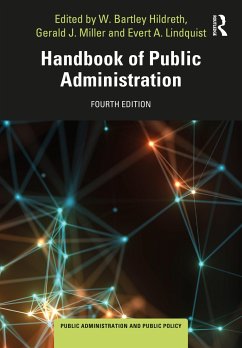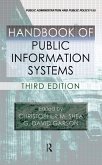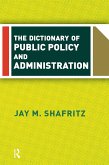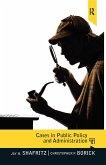Handbook of Public Administration
Herausgeber: Hildreth, W. Bartley; Lindquist, Evert L; Miller, Gerald
Handbook of Public Administration
Herausgeber: Hildreth, W. Bartley; Lindquist, Evert L; Miller, Gerald
- Gebundenes Buch
- Merkliste
- Auf die Merkliste
- Bewerten Bewerten
- Teilen
- Produkt teilen
- Produkterinnerung
- Produkterinnerung
The Handbook of Public Administration, Fourth Edition provides a compelling introduction to and depiction of the contemporary realities of public administration, and it will inspire new avenues of inquiry for the next generation of public-administration researchers.
Andere Kunden interessierten sich auch für
![International Perspectives on Public Administration International Perspectives on Public Administration]() Henry T. SardaryanInternational Perspectives on Public Administration74,99 €
Henry T. SardaryanInternational Perspectives on Public Administration74,99 €![Handbook of Public Information Systems Handbook of Public Information Systems]() Handbook of Public Information Systems290,99 €
Handbook of Public Information Systems290,99 €![The Dictionary Of Public Policy And Administration The Dictionary Of Public Policy And Administration]() Jay ShafritzThe Dictionary Of Public Policy And Administration195,99 €
Jay ShafritzThe Dictionary Of Public Policy And Administration195,99 €![Cases in Public Policy and Administration Cases in Public Policy and Administration]() Jay M. ShafritzCases in Public Policy and Administration260,99 €
Jay M. ShafritzCases in Public Policy and Administration260,99 €![Public Administration and Public Policy in Ireland Public Administration and Public Policy in Ireland]() Maura Adshead / Michelle Millar (eds.)Public Administration and Public Policy in Ireland249,99 €
Maura Adshead / Michelle Millar (eds.)Public Administration and Public Policy in Ireland249,99 €![Public Administration Public Administration]() B Guy PetersPublic Administration238,99 €
B Guy PetersPublic Administration238,99 €![Public Administration & Public Management Public Administration & Public Management]() Jan-Erik LanePublic Administration & Public Management260,99 €
Jan-Erik LanePublic Administration & Public Management260,99 €-
-
-
The Handbook of Public Administration, Fourth Edition provides a compelling introduction to and depiction of the contemporary realities of public administration, and it will inspire new avenues of inquiry for the next generation of public-administration researchers.
Hinweis: Dieser Artikel kann nur an eine deutsche Lieferadresse ausgeliefert werden.
Hinweis: Dieser Artikel kann nur an eine deutsche Lieferadresse ausgeliefert werden.
Produktdetails
- Produktdetails
- Verlag: Routledge
- 4. Auflage
- Seitenzahl: 350
- Erscheinungstermin: 27. Mai 2021
- Englisch
- Abmessung: 260mm x 183mm x 23mm
- Gewicht: 854g
- ISBN-13: 9781498750035
- ISBN-10: 1498750036
- Artikelnr.: 60001672
- Herstellerkennzeichnung
- Libri GmbH
- Europaallee 1
- 36244 Bad Hersfeld
- gpsr@libri.de
- Verlag: Routledge
- 4. Auflage
- Seitenzahl: 350
- Erscheinungstermin: 27. Mai 2021
- Englisch
- Abmessung: 260mm x 183mm x 23mm
- Gewicht: 854g
- ISBN-13: 9781498750035
- ISBN-10: 1498750036
- Artikelnr.: 60001672
- Herstellerkennzeichnung
- Libri GmbH
- Europaallee 1
- 36244 Bad Hersfeld
- gpsr@libri.de
W. Bartley Hildreth is Professor and former Dean in the Andrew Young School of Policy Studies at Georgia State University in Atlanta. He is a Fulbright scholar, a fellow of the National Academy of Public Administration, and recipient of the Aaron B. Wildavsky Award for lifetime scholarship. Gerald J. Miller retired in 2017 as Professor of Public Administration in the School of Public Affairs at Arizona State University in Phoenix. He was a Fulbright Scholar and received the Aaron B. Wildavsky Award for lifetime scholarship. Evert A. Lindquist is Professor, School of Public Administration, University of Victoria, and former Director of the School (1998-2015). He serves as Editor of the Institute of Public Administration of Canada's scholarly journal, Canadian Public Administration.
Dedication. Author bios. 1. Introduction to the Fourth Edition of the
Handbook of Public Administration (Evert Lindquist, W. Bartley Hildreth,
and Gerald J. Miller). PART 1: THE CONTEMPORARY COMPLEXITY OF PUBLIC
ADMINISTRATION. Foundations and Tensions in Public Administration. 2. A
Transfer-of-Idea Approach to the History of Public Administration: The
Hybridizations of Administrative Traditions (Céline Mavrot, Christian
Rosser, Fritz Sager, Pascal Hurni). 3. The Administrative Presidency and
the Degradation of the United States Civil Service (William G. Resh). 4.
The Idea of Administrative Law and the Expansion of the Administrative
State (Lorne Sossin) 5. The Challenges of Discretion, Collaboration, and
Ambiguity for Administrative Law: Researchable Themes & Issues (Christine
Ledvinka Rush). The Evolving and Increasing Variety of Public
Administration. 6. Federalism and Multilevel Governance: Contexts for
Public Administration (Herman Bakvis). 7. Concurrent Sourcing in Public
Services: Theory, Evidence and Future Research (Simon Porcher). 8.
Multilevel Network Governance in Emergency Management (Qian Hu & Naim
Kapucu). 9. The Many Publics of Government Organizations (John Clayton
Thomas & John Alford). 10. Engaging Citizens, Clients and Communities for
Policy and Service Delivery (Robyn Keast). Analyzing Public Administration
with Complexity Lens. 11. Complexity in Public Management - Perspectives,
Institutions and Practices (Elizabeth Eppel, Mary Lee Rhodes, Lasse
Gerritts). 12. How Complexity Informs Public Policy and Administrative
Practice: Selected International Cases (Mary-Lee Rhodes, Lasse Gerrits, and
Elizabeth Eppel). 13. The Enmeshment of the Machine in Complex Governance
Processes and Networks (Lasse Gerrits, Elizabeth Eppel, Mary Lee Rhodes).
PART 2: CRUCIBLES FOR PUBLIC ADMINISTRATION: MONEY, PEOPLE, POLICY.
Budgeting and Performance Monitoring for More Complex Environments. 14.
From Theories to Practice: The Ongoing Search for Control, Efficiency,
Transparency and Results in Government (Katherine G. Willoughby). 15.
Conformity and Diversity in Budgetary Systems: Aspirations, Routines, and
Recalibration (John Wanna). 16. Performance Management: Experience and
Challenges (Tom Christensen & Per Laegrid). 17. Aptitude, Accountability,
and Adaptation: Research Themes for Public Budgeting, Financial Management,
and Accountability (Justin Marlowe). Modernizing Human Resources Systems
for the Public Sector. 18. Developing Public Servants: International Trends
in Human Resource Management (Rex L. Facer). 19. Human Resource Reforms in
South Asia, the Caribbean, Latin America, and the United States (Charlene
Roach, Shahrin Shabnam Upoma, Meghna Sabharwal, Hugo Renderos). 20. Rapid
Advances in HRM Technologies and Public Employment Systems: A Research
Agenda for Acquiring and Managing Talent (Jared Llorens). Public
Administration and Regenerating the Policy Cycle. 21. The Policy Cycle and
Policy Theory: From Theory-building to Policy Making (Catheine Althaus &
David Threlfall). 22. Agenda-setting in Comparative Perspective:
Contrasting Policy-Making in France, the United Kingdom and the United
States (Emiliano Grossman & Friederike Richter). 23. The Policy Cycle:
Moving From Heuristic to a Theory-Informed Research Agenda (draft in
progress) (Evert Lindquist & Adam Wellstead). Index.
Handbook of Public Administration (Evert Lindquist, W. Bartley Hildreth,
and Gerald J. Miller). PART 1: THE CONTEMPORARY COMPLEXITY OF PUBLIC
ADMINISTRATION. Foundations and Tensions in Public Administration. 2. A
Transfer-of-Idea Approach to the History of Public Administration: The
Hybridizations of Administrative Traditions (Céline Mavrot, Christian
Rosser, Fritz Sager, Pascal Hurni). 3. The Administrative Presidency and
the Degradation of the United States Civil Service (William G. Resh). 4.
The Idea of Administrative Law and the Expansion of the Administrative
State (Lorne Sossin) 5. The Challenges of Discretion, Collaboration, and
Ambiguity for Administrative Law: Researchable Themes & Issues (Christine
Ledvinka Rush). The Evolving and Increasing Variety of Public
Administration. 6. Federalism and Multilevel Governance: Contexts for
Public Administration (Herman Bakvis). 7. Concurrent Sourcing in Public
Services: Theory, Evidence and Future Research (Simon Porcher). 8.
Multilevel Network Governance in Emergency Management (Qian Hu & Naim
Kapucu). 9. The Many Publics of Government Organizations (John Clayton
Thomas & John Alford). 10. Engaging Citizens, Clients and Communities for
Policy and Service Delivery (Robyn Keast). Analyzing Public Administration
with Complexity Lens. 11. Complexity in Public Management - Perspectives,
Institutions and Practices (Elizabeth Eppel, Mary Lee Rhodes, Lasse
Gerritts). 12. How Complexity Informs Public Policy and Administrative
Practice: Selected International Cases (Mary-Lee Rhodes, Lasse Gerrits, and
Elizabeth Eppel). 13. The Enmeshment of the Machine in Complex Governance
Processes and Networks (Lasse Gerrits, Elizabeth Eppel, Mary Lee Rhodes).
PART 2: CRUCIBLES FOR PUBLIC ADMINISTRATION: MONEY, PEOPLE, POLICY.
Budgeting and Performance Monitoring for More Complex Environments. 14.
From Theories to Practice: The Ongoing Search for Control, Efficiency,
Transparency and Results in Government (Katherine G. Willoughby). 15.
Conformity and Diversity in Budgetary Systems: Aspirations, Routines, and
Recalibration (John Wanna). 16. Performance Management: Experience and
Challenges (Tom Christensen & Per Laegrid). 17. Aptitude, Accountability,
and Adaptation: Research Themes for Public Budgeting, Financial Management,
and Accountability (Justin Marlowe). Modernizing Human Resources Systems
for the Public Sector. 18. Developing Public Servants: International Trends
in Human Resource Management (Rex L. Facer). 19. Human Resource Reforms in
South Asia, the Caribbean, Latin America, and the United States (Charlene
Roach, Shahrin Shabnam Upoma, Meghna Sabharwal, Hugo Renderos). 20. Rapid
Advances in HRM Technologies and Public Employment Systems: A Research
Agenda for Acquiring and Managing Talent (Jared Llorens). Public
Administration and Regenerating the Policy Cycle. 21. The Policy Cycle and
Policy Theory: From Theory-building to Policy Making (Catheine Althaus &
David Threlfall). 22. Agenda-setting in Comparative Perspective:
Contrasting Policy-Making in France, the United Kingdom and the United
States (Emiliano Grossman & Friederike Richter). 23. The Policy Cycle:
Moving From Heuristic to a Theory-Informed Research Agenda (draft in
progress) (Evert Lindquist & Adam Wellstead). Index.
Dedication. Author bios. 1. Introduction to the Fourth Edition of the
Handbook of Public Administration (Evert Lindquist, W. Bartley Hildreth,
and Gerald J. Miller). PART 1: THE CONTEMPORARY COMPLEXITY OF PUBLIC
ADMINISTRATION. Foundations and Tensions in Public Administration. 2. A
Transfer-of-Idea Approach to the History of Public Administration: The
Hybridizations of Administrative Traditions (Céline Mavrot, Christian
Rosser, Fritz Sager, Pascal Hurni). 3. The Administrative Presidency and
the Degradation of the United States Civil Service (William G. Resh). 4.
The Idea of Administrative Law and the Expansion of the Administrative
State (Lorne Sossin) 5. The Challenges of Discretion, Collaboration, and
Ambiguity for Administrative Law: Researchable Themes & Issues (Christine
Ledvinka Rush). The Evolving and Increasing Variety of Public
Administration. 6. Federalism and Multilevel Governance: Contexts for
Public Administration (Herman Bakvis). 7. Concurrent Sourcing in Public
Services: Theory, Evidence and Future Research (Simon Porcher). 8.
Multilevel Network Governance in Emergency Management (Qian Hu & Naim
Kapucu). 9. The Many Publics of Government Organizations (John Clayton
Thomas & John Alford). 10. Engaging Citizens, Clients and Communities for
Policy and Service Delivery (Robyn Keast). Analyzing Public Administration
with Complexity Lens. 11. Complexity in Public Management - Perspectives,
Institutions and Practices (Elizabeth Eppel, Mary Lee Rhodes, Lasse
Gerritts). 12. How Complexity Informs Public Policy and Administrative
Practice: Selected International Cases (Mary-Lee Rhodes, Lasse Gerrits, and
Elizabeth Eppel). 13. The Enmeshment of the Machine in Complex Governance
Processes and Networks (Lasse Gerrits, Elizabeth Eppel, Mary Lee Rhodes).
PART 2: CRUCIBLES FOR PUBLIC ADMINISTRATION: MONEY, PEOPLE, POLICY.
Budgeting and Performance Monitoring for More Complex Environments. 14.
From Theories to Practice: The Ongoing Search for Control, Efficiency,
Transparency and Results in Government (Katherine G. Willoughby). 15.
Conformity and Diversity in Budgetary Systems: Aspirations, Routines, and
Recalibration (John Wanna). 16. Performance Management: Experience and
Challenges (Tom Christensen & Per Laegrid). 17. Aptitude, Accountability,
and Adaptation: Research Themes for Public Budgeting, Financial Management,
and Accountability (Justin Marlowe). Modernizing Human Resources Systems
for the Public Sector. 18. Developing Public Servants: International Trends
in Human Resource Management (Rex L. Facer). 19. Human Resource Reforms in
South Asia, the Caribbean, Latin America, and the United States (Charlene
Roach, Shahrin Shabnam Upoma, Meghna Sabharwal, Hugo Renderos). 20. Rapid
Advances in HRM Technologies and Public Employment Systems: A Research
Agenda for Acquiring and Managing Talent (Jared Llorens). Public
Administration and Regenerating the Policy Cycle. 21. The Policy Cycle and
Policy Theory: From Theory-building to Policy Making (Catheine Althaus &
David Threlfall). 22. Agenda-setting in Comparative Perspective:
Contrasting Policy-Making in France, the United Kingdom and the United
States (Emiliano Grossman & Friederike Richter). 23. The Policy Cycle:
Moving From Heuristic to a Theory-Informed Research Agenda (draft in
progress) (Evert Lindquist & Adam Wellstead). Index.
Handbook of Public Administration (Evert Lindquist, W. Bartley Hildreth,
and Gerald J. Miller). PART 1: THE CONTEMPORARY COMPLEXITY OF PUBLIC
ADMINISTRATION. Foundations and Tensions in Public Administration. 2. A
Transfer-of-Idea Approach to the History of Public Administration: The
Hybridizations of Administrative Traditions (Céline Mavrot, Christian
Rosser, Fritz Sager, Pascal Hurni). 3. The Administrative Presidency and
the Degradation of the United States Civil Service (William G. Resh). 4.
The Idea of Administrative Law and the Expansion of the Administrative
State (Lorne Sossin) 5. The Challenges of Discretion, Collaboration, and
Ambiguity for Administrative Law: Researchable Themes & Issues (Christine
Ledvinka Rush). The Evolving and Increasing Variety of Public
Administration. 6. Federalism and Multilevel Governance: Contexts for
Public Administration (Herman Bakvis). 7. Concurrent Sourcing in Public
Services: Theory, Evidence and Future Research (Simon Porcher). 8.
Multilevel Network Governance in Emergency Management (Qian Hu & Naim
Kapucu). 9. The Many Publics of Government Organizations (John Clayton
Thomas & John Alford). 10. Engaging Citizens, Clients and Communities for
Policy and Service Delivery (Robyn Keast). Analyzing Public Administration
with Complexity Lens. 11. Complexity in Public Management - Perspectives,
Institutions and Practices (Elizabeth Eppel, Mary Lee Rhodes, Lasse
Gerritts). 12. How Complexity Informs Public Policy and Administrative
Practice: Selected International Cases (Mary-Lee Rhodes, Lasse Gerrits, and
Elizabeth Eppel). 13. The Enmeshment of the Machine in Complex Governance
Processes and Networks (Lasse Gerrits, Elizabeth Eppel, Mary Lee Rhodes).
PART 2: CRUCIBLES FOR PUBLIC ADMINISTRATION: MONEY, PEOPLE, POLICY.
Budgeting and Performance Monitoring for More Complex Environments. 14.
From Theories to Practice: The Ongoing Search for Control, Efficiency,
Transparency and Results in Government (Katherine G. Willoughby). 15.
Conformity and Diversity in Budgetary Systems: Aspirations, Routines, and
Recalibration (John Wanna). 16. Performance Management: Experience and
Challenges (Tom Christensen & Per Laegrid). 17. Aptitude, Accountability,
and Adaptation: Research Themes for Public Budgeting, Financial Management,
and Accountability (Justin Marlowe). Modernizing Human Resources Systems
for the Public Sector. 18. Developing Public Servants: International Trends
in Human Resource Management (Rex L. Facer). 19. Human Resource Reforms in
South Asia, the Caribbean, Latin America, and the United States (Charlene
Roach, Shahrin Shabnam Upoma, Meghna Sabharwal, Hugo Renderos). 20. Rapid
Advances in HRM Technologies and Public Employment Systems: A Research
Agenda for Acquiring and Managing Talent (Jared Llorens). Public
Administration and Regenerating the Policy Cycle. 21. The Policy Cycle and
Policy Theory: From Theory-building to Policy Making (Catheine Althaus &
David Threlfall). 22. Agenda-setting in Comparative Perspective:
Contrasting Policy-Making in France, the United Kingdom and the United
States (Emiliano Grossman & Friederike Richter). 23. The Policy Cycle:
Moving From Heuristic to a Theory-Informed Research Agenda (draft in
progress) (Evert Lindquist & Adam Wellstead). Index.








